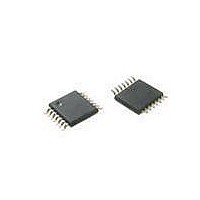ATTINY20-XU Atmel, ATTINY20-XU Datasheet - Page 105

ATTINY20-XU
Manufacturer Part Number
ATTINY20-XU
Description
MCU AVR 2KB FLASH 12MHZ 14TSSOP
Manufacturer
Atmel
Series
AVR® ATtinyr
Datasheet
1.ATTINY20-EK1.pdf
(224 pages)
Specifications of ATTINY20-XU
Core Processor
AVR
Core Size
8-Bit
Speed
12MHz
Connectivity
I²C, SPI
Peripherals
Brown-out Detect/Reset, POR, PWM, WDT
Number Of I /o
12
Program Memory Size
2KB (1K x 16)
Program Memory Type
FLASH
Ram Size
128 x 8
Voltage - Supply (vcc/vdd)
1.8 V ~ 5.5 V
Data Converters
A/D 8x10b
Oscillator Type
Internal
Operating Temperature
-40°C ~ 85°C
Package / Case
*
Processor Series
ATtiny
Core
AVR
Data Bus Width
8 bit
Data Ram Size
128 B
Interface Type
SPI, TWI
Maximum Clock Frequency
12 MHz
Number Of Programmable I/os
12
Number Of Timers
2
Operating Supply Voltage
3.3 V
Maximum Operating Temperature
+ 85 C
Mounting Style
SMD/SMT
Minimum Operating Temperature
- 40 C
Operating Temperature Range
- 40 C to + 85 C
Lead Free Status / RoHS Status
Lead free / RoHS Compliant
Eeprom Size
-
Lead Free Status / Rohs Status
Details
Available stocks
Company
Part Number
Manufacturer
Quantity
Price
Company:
Part Number:
ATTINY20-XU
Manufacturer:
Atmel
Quantity:
904
- Current page: 105 of 224
- Download datasheet (6Mb)
13. Timer/Counter Prescaler
13.1
13.2
8235B–AVR–04/11
Prescaler Reset
External Clock Source
Timer/Counter0 and Timer/Counter1 share the same prescaler module, but the Timer/Counters
can have different prescaler settings. The description below applies to both Timer/Counters. Tn
is used as a general name, n = 0, 1.
The Timer/Counter can be clocked directly by the system clock (by setting the CSn[2:0] = 1).
This provides the fastest operation, with a maximum Timer/Counter clock frequency equal to
system clock frequency (f
as a clock source. The prescaled clock has a frequency of either f
f
The prescaler is free running, i.e., operates independently of the Clock Select logic of the
Timer/CounterCounter, and it is shared by the Timer/Counter Tn. Since the prescaler is not
affected by the Timer/Counter’s clock select, the state of the prescaler will have implications for
situations where a prescaled clock is used. One example of prescaling artifacts occurs when the
timer is enabled and clocked by the prescaler (CSn[2:0] = 2, 3, 4, or 5). The number of system
clock cycles from when the timer is enabled to the first count occurs can be from 1 to N+1 sys-
tem clock cycles, where N equals the prescaler divisor (8, 64, 256, or 1024).
It is possible to use the Prescaler Reset for synchronizing the Timer/Counter to program
execution.
An external clock source applied to the Tn pin can be used as Timer/Counter clock (clk
Tn pin is sampled once every system clock cycle by the pin synchronization logic. The synchro-
nized (sampled) signal is then passed through the edge detector.
equivalent block diagram of the Tn synchronization and edge detector logic. The registers are
clocked at the positive edge of the internal system clock (
high period of the internal system clock.
The edge detector generates one clk
(CSn[2:0] = 6) edge it detects.
Figure 13-1. T0 Pin Sampling
The synchronization and edge detector logic introduces a delay of 2.5 to 3.5 system clock cycles
from an edge has been applied to the Tn pin to the counter is updated.
CLK_I/O
Tn
clk
I/O
/256, or f
D
LE
CLK_I/O
Q
/1024.
Synchronization
CLK_I/O
D
Q
). Alternatively, one of four taps from the prescaler can be used
T
0
pulse for each positive (CSn[2:0] = 7) or negative
clk
I/O
D
). The latch is transparent in the
Figure 13-1
Q
CLK_I/O
Edge Detector
shows a functional
ATtiny20
/8, f
CLK_I/O
Tn_sync
(To Clock
Select Logic)
Tn
). The
/64,
105
Related parts for ATTINY20-XU
Image
Part Number
Description
Manufacturer
Datasheet
Request
R

Part Number:
Description:
IC, MCU, 8BIT, 2K FLASH, 20SOIC
Manufacturer:
Atmel
Datasheet:

Part Number:
Description:
IC, MCU, 8BIT, 2K FLASH, 20PDIP
Manufacturer:
Atmel
Datasheet:

Part Number:
Description:
IC, MCU, 8BIT, 8K FLASH, 20PDIP
Manufacturer:
Atmel
Datasheet:

Part Number:
Description:
IC, MCU, 8BIT, 8K FLASH, 20SOIC
Manufacturer:
Atmel
Datasheet:

Part Number:
Description:
DEV KIT FOR AVR/AVR32
Manufacturer:
Atmel
Datasheet:

Part Number:
Description:
INTERVAL AND WIPE/WASH WIPER CONTROL IC WITH DELAY
Manufacturer:
ATMEL Corporation
Datasheet:

Part Number:
Description:
Low-Voltage Voice-Switched IC for Hands-Free Operation
Manufacturer:
ATMEL Corporation
Datasheet:

Part Number:
Description:
MONOLITHIC INTEGRATED FEATUREPHONE CIRCUIT
Manufacturer:
ATMEL Corporation
Datasheet:

Part Number:
Description:
AM-FM Receiver IC U4255BM-M
Manufacturer:
ATMEL Corporation
Datasheet:

Part Number:
Description:
Monolithic Integrated Feature Phone Circuit
Manufacturer:
ATMEL Corporation
Datasheet:

Part Number:
Description:
Multistandard Video-IF and Quasi Parallel Sound Processing
Manufacturer:
ATMEL Corporation
Datasheet:

Part Number:
Description:
High-performance EE PLD
Manufacturer:
ATMEL Corporation
Datasheet:











